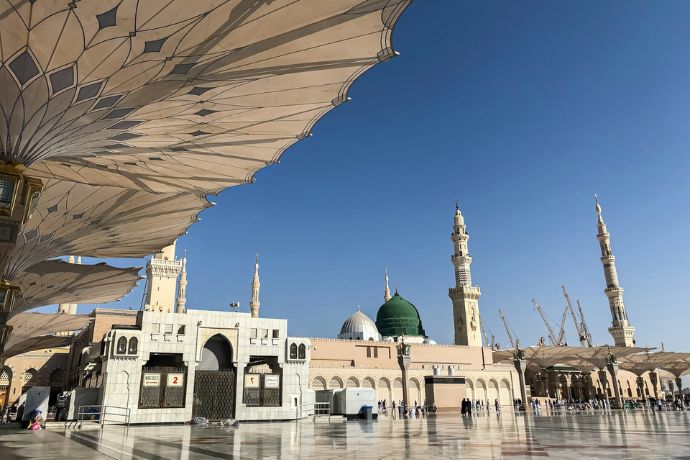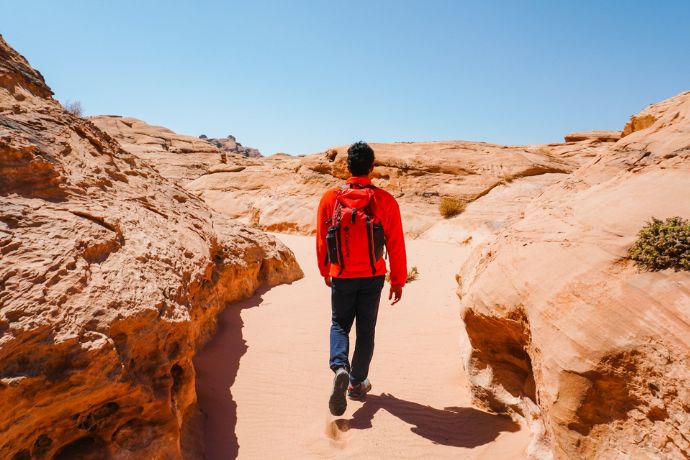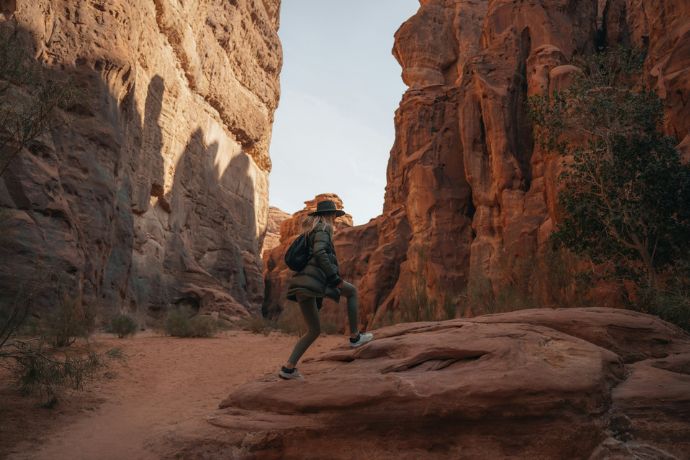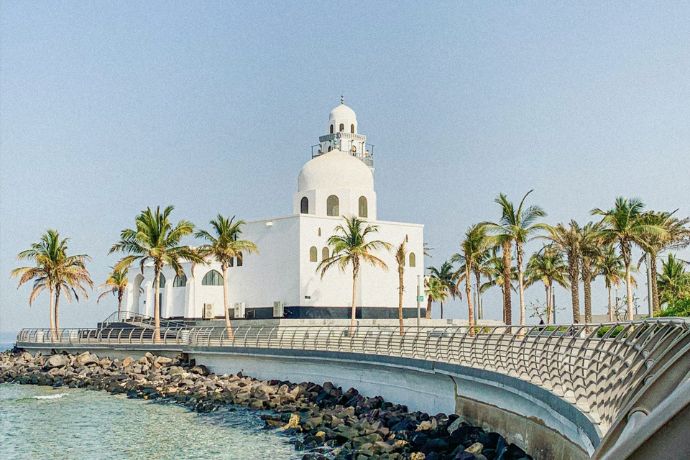- Blog
- Travel tips and safety
- Saudi Arabia Travel Safety: What Every Visitor Needs to Know
Saudi Arabia Travel Safety: What Every Visitor Needs to Know
When you plan to take a trip to Saudi Arabia, you should be able to realize that it is a commonly visited country among international tourists, and the kingdom has worked hard to boost its appeal to all international travelers through Vision 2030. Visiting Saudi Arabia means a variety of experiences because it combines religious Islamic pilgrimage trails with futuristic cities and desert escapades. But like any international destination, understanding the Saudi Arabia travel safety landscape is essential for a smooth, worry-free trip.
We shall discuss the present safety level in the kingdom, health and safety regulations, cultural standards, gender-related recommendations, transportation-related concerns, and reasons why Saudi Arabia travel insurance is a necessity throughout the course of this exhaustive guide.
 The white building Al-Masjid an-Nabawī in Saudi Arabia
The white building Al-Masjid an-Nabawī in Saudi Arabia
1. Is It Safe to Travel to Saudi Arabia?
Let’s start by answering the most pressing question: is it safe to travel to Saudi Arabia?
The answer to this question is YES, the tourists consider Saudi Arabia to be one of the safest countries in the Middle East. The kingdom is ranked as one of the least crime-prone nations in the world, owing partly to the good implementation of laws and improved surveillance systems. Pickpocketing is an uncommon thing, and violent crime is rare in major cities, and tourists are generally safe.
Nevertheless, it is also necessary to remind travelers that they ought to be extra careful and follow the local laws and culture. The nation follows the Islamic law (Sharia), and punishment for violations may be stern. When it comes to making the most out of your travel safety in Saudi Arabia, the best thing you can do is to keep yourself always informed and prepared.
2. Safe Places to Visit in Saudi Arabia
Saudi Arabia has numerous tourist-friendly cities and regions that are not only culturally rich but also safe:
- Riyadh – The capital there are modern facilities, museums and business centres.
- Jeddah – A maritime treasure trove on Red Sea beaches and UNESCO sites.
- Al-Ula – An astonishing archaeological site having rock tombs and deserted sceneries.
- Abha – is a cooler town in the south which is also a scenic town with its mountains.
- Dammam & Khobar – The family friendly cities in the Eastern Province.
Visitors are warned of border zones between Yemen and Iraq since there is political tension. Such areas are more under military radars, and they might be risky.
3. Crime and Personal Safety
Saudi Arabia has low crime rates. The majority of the malls, religious places, and most public places are under close security, especially during the Hajj and Umrah seasons in Makkah and Madinah.
Still, here are a few personal safety tips:
- Keep personal items safe, particularly in the busy markets.
- Avoid walking alone in remote areas at night.
- Take registered cabs or book with Uber or Careem instead of cars that pick you up on the street.
Being proactive and alert ensures your Saudi Arabia travel safety remains intact throughout your trip.
4. Legal and Cultural Norms
Islamic values have really dominated the Saudi laws. Consequently, there is a certain code of behavior to be followed by the visitors.
Key laws to remember:
- The use of alcohol and drugs is strictly prohibited.
- Public displays of affection are considered inappropriate.
- Betting, porn, and objectionable religious documents are prohibited.
- It is illegal to take photographs of government buildings, military bases, and individuals (and especially women) without their consent.
Dress modestly; avoid short skirts or shorts above the knee in public places. Women no longer have to wear an abaya by law, but wearing long, loose, and modest clothing is strongly recommended to respect local customs and avoid unwanted attention.
Understanding and respecting these cultural expectations is essential for Saudi Arabia travel safety.
 A man is walking through the Hisma Desert, Saudi Arabia
A man is walking through the Hisma Desert, Saudi Arabia
5. Female Travelers: What to Know
Saudi Arabia has registered tremendous improvements concerning gender equality. Women are also able to drive, go on travel alone and not be accompanied by any male family member, and go to the event without being under male guardianship. Nevertheless, there is leftover conservatism.
Tips for female travelers:
- Opt for well-reviewed hotels in central, busy areas.
- Dress modestly to avoid unwanted attention.
- Avoid public transport late at night; choose ride-hailing apps.
- Use women-only sections in mosques and some restaurants when available.
Women traveling with Travelner Insurance also have access to 24/7 emergency assistance, which adds a vital layer of security for solo female tourists.
 Amongst expansive red sands, Hisma Desert
Amongst expansive red sands, Hisma Desert
6. Transportation and Road Safety
Road networks are maintained in good condition in Saudi Arabia, and its traffic may be high-tempo and unpredictable. Others are undisciplined with regard to lanes and speed limits, especially in the big cities.
Tips for safe travel:
- Avoid self-driving unless you’re experienced with local road rules.
- Use apps like Uber and Careem for reliable transport.
- When taking intercity trips, opt for airlines or trains rather than long-distance buses.
- Be cautious crossing streets; pedestrian right-of-way is not always observed.
Adhering to these practices ensures your Saudi Arabia travel safety while on the move.
7. Health Services and Emergency Preparedness
Medical facilities and hospitals in Saudi Arabia are of the highest standards, especially in the cities. Most of them are operating in English, and they serve international patients.
Emergency Numbers:
- Police: 999
- Ambulance: 997
- Fire Services: 998
However, medical care in Saudi Arabia is expensive for non-residents. That’s where having the right insurance becomes vital.
8. Travel Insurance for Saudi Arabia
Comprehensive coverage is a non-negotiable aspect of any international trip, and that includes the Kingdom.
There are some travel insurance requirements by Saudi authorities, especially for those about to apply for an eVisa. The policy must include:
- Medical coverage
- Emergency hospitalization
- Repatriation costs
- COVID-19 treatment
These Saudi Arabia travel insurance requirements are strictly enforced, especially during visa processing.
This is why Travelner Insurance is a favored insurance for tourists. They provide a cost-effective but complete travel insurance package that covers all the required procedures in Saudi Arabia, ensuring your trip is secure and compliant.
9. Why Choose Travelner Insurance?
Here’s what makes Travelner Insurance a trusted partner for international travelers:
- Instant Certificate: Suitable as a supplemental policy alongside your mandatory eVisa insurance.
- Affordable Plans: Great for both short-term and long-term stays
- COVID-19 Coverage: Included in all plans
- 24/7 Global Support: Multilingual emergency assistance
- Digital Claims Processing: Simple, fast, and paperless
Travelner enhances your travel safety in Saudi Arabia by offering comprehensive insurance coverage, 24/7 multilingual emergency support, and quick digital claims—ensuring peace of mind whether you're visiting for tourism, pilgrimage, or business.
10. Cyber and Digital Safety
While Saudi Arabia is generally cyber-secure, travelers should still take precautions:
- Avoid accessing sensitive accounts over public Wi-Fi.
- Use VPNs if you need to access blocked websites.
- Download apps such as Tawakkalna, which are used for public events, health alerts, and government services. COVID health status tracking is less strict than in past years but may still apply during outbreaks.
Note: These apps often require a Saudi local phone number and a valid Iqama (residency permit) or national ID for full registration. As a visitor, you may need help from your hotel or sponsor to activate basic access. Plan accordingly.
Note: that some websites and services are blocked in Saudi Arabia due to local regulations, and the use of VPNs, while legal, should be done cautiously.
 White building in Jeddah, Saudi Arabia
White building in Jeddah, Saudi Arabia
11. Safety During Major Events: Hajj, Umrah, and Festivals
Large events like Hajj and Umrah attract millions of visitors and require additional vigilance:
- Stay hydrated and avoid heatstroke—temperatures can exceed 45°C.
- Keep a copy of your ID and insurance documents.
- Be cautious in large crowds and always follow official instructions.
The Travelner Insurance also provides pilgrim-specific packages that include heat-related diseases, exhaustion, and evacuation. It is also an essential partner in the event of Saudi Arabia's travel safety during high seasons.
12. In Case of Emergency
If you encounter legal trouble, health emergencies, or lose your passport:
- Contact your embassy or consulate immediately.
- Use your Travelner Insurance support hotline for real-time assistance.
- Visit a certified hospital or clinic for medical issues (Travelner provides a list of partner hospitals).
Preparedness is key. It is better to have all emergency numbers stored both digitally and physically to improve your safety.
Final Thoughts: Is Saudi Arabia Safe for Tourists?
Absolutely—Saudi Arabia's travel safety standards have improved dramatically over the last decade. It will be safe and fulfilling provided that you do not disrespect the culture and are in accordance with the laws and that you educate yourself.
Nevertheless, avoid unnecessary risks. Purchasing Saudi Arabia travel insurance before you get on board is recommended. Travelner Insurance is more than just a visa requirement—it offers a reliable safety net for your health, your belongings, and your peace of mind throughout your stay in Saudi Arabia.
Explore tailored travel insurance and protect your trip now!
Related articles

Dec 15, 2025
The Ultimate Guide to New Year Vacation Ideas for an Unforgettable Celebration

Dec 15, 2025
A Complete Travel Guide to Celebrating Lunar New Year Around the World

Dec 15, 2025
The Ultimate Guide to Planning a Christmas Family Vacation

Dec 15, 2025







